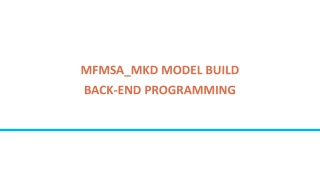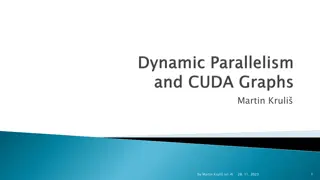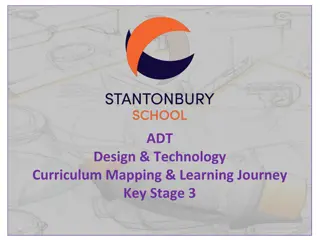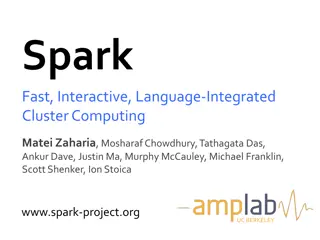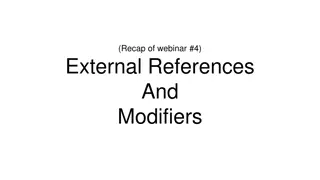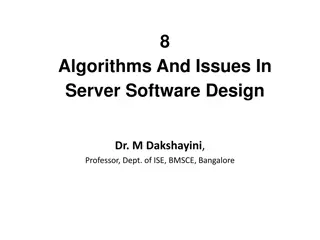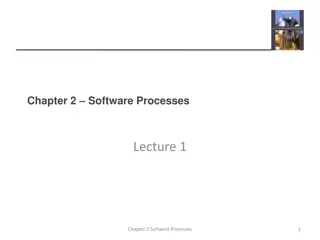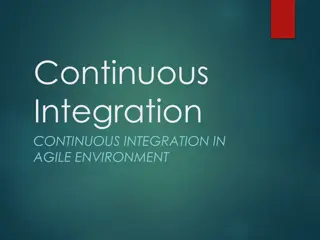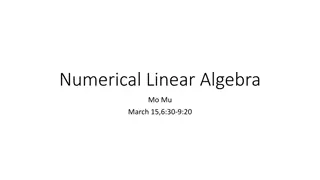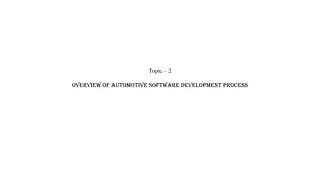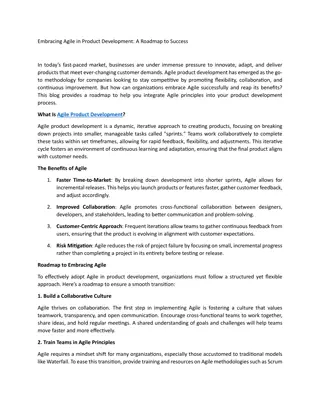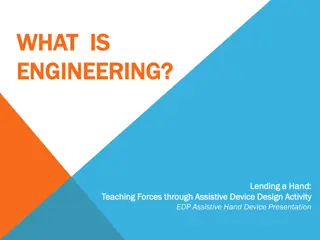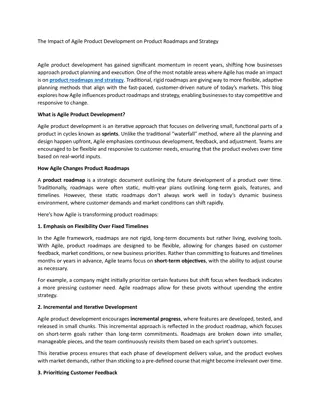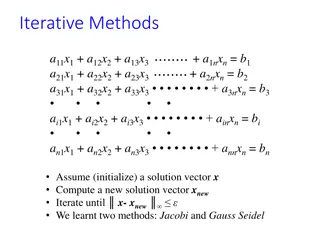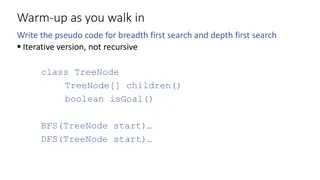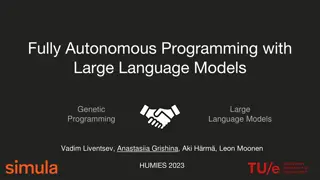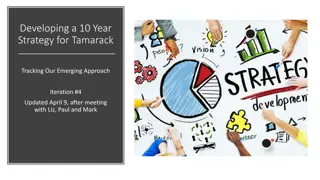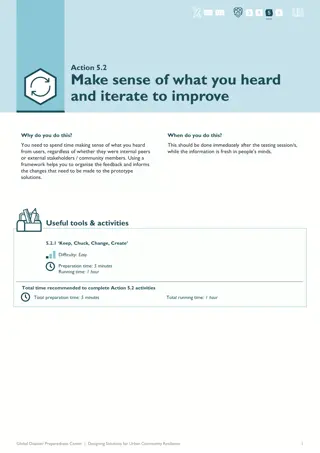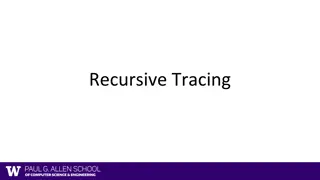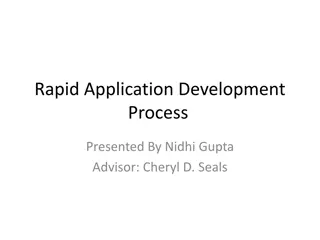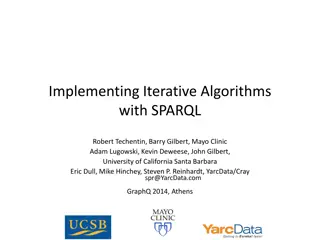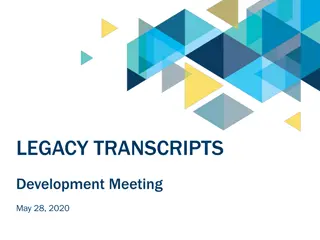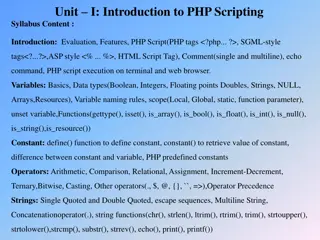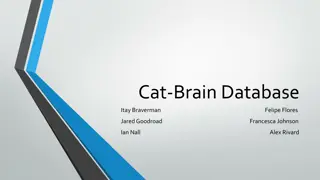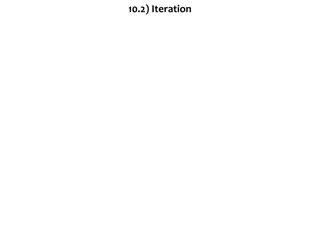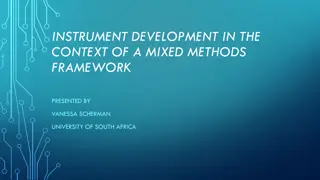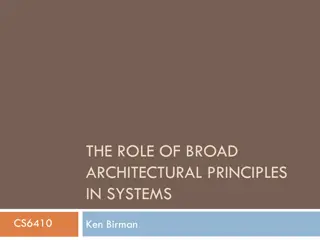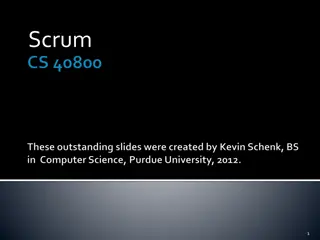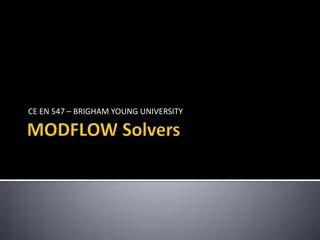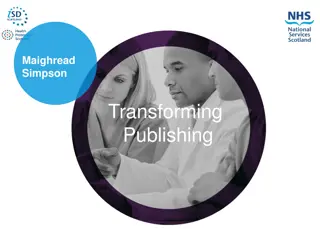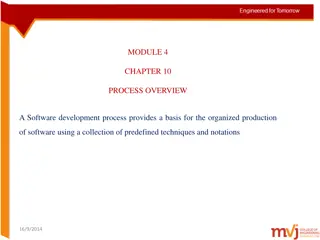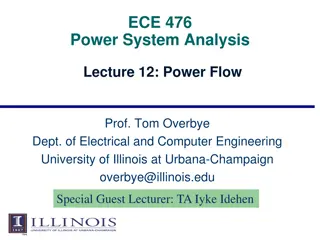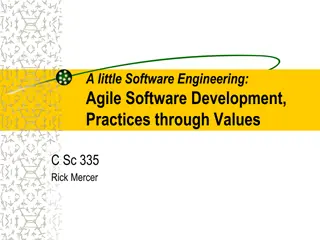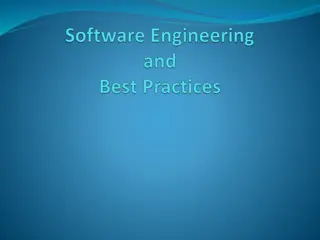Modern End-to-End Programming: Data Preparation, Model Building & Debugging
Prepare, build, debug models covering historical data. Make assumptions, solve equations, ensure data, economic consistency. Iterative processes for accurate simulations.
3 views • 10 slides
GCSE Design Technology Knowledge Organiser and Course Structure Overview
In this detailed knowledge organiser, find information about the GCSE Design Technology course structure, learning objectives, mission statement, and core technical principles for KS4 students. The course emphasizes iterative design cycles, creative thinking, problem-solving, and addressing environm
7 views • 53 slides
Understanding Parallelism in GPU Computing by Martin Kruli
This content delves into different types of parallelism in GPU computing, such as task parallelism and data parallelism, along with discussing unsuitable problems for GPUs and providing solutions like iterative kernel execution and mapping irregular structures to regular grids. The article also touc
1 views • 39 slides
Root Cause Analysis for Campaign Challenges
Root Cause Analysis (RCA) is a problem-solving method used to identify underlying causes of key process challenges in campaigns. It helps in learning from bottlenecks and successes to improve future outcomes. This analysis involves understanding what happened, why it happened, and what actions can b
7 views • 18 slides
Crafting Success How Effective Persona Creation Drives Design Success
Consagous Technologies UI UX Experts has ability to create experiences that resonate with users on a deep and personal level. Effective persona creation is the cornerstone of this success, enabling designers to understand their audience, guide design decisions, foster empathy, and drive iterative im
2 views • 2 slides
What is Email Marketing?
Email marketing is a cornerstone of digital marketing, leveraging targeted email communication to engage subscribers and drive desired outcomes. By crafting compelling content, personalized messages, and strategic segmentation, businesses can cultivate meaningful relationships with their audience. B
1 views • 7 slides
Design & Technology Learning Journey at Key Stage 3
Explore the ADT Design & Technology Curriculum Mapping and Learning Journey at Key Stage 3, focusing on the iterative design process. Dive into the essential concepts, skills, and experiences that students will encounter in this engaging educational pathway.
0 views • 26 slides
Understanding Apache Spark: Fast, Interactive, Cluster Computing
Apache Spark, developed by Matei Zaharia and team at UC Berkeley, aims to enhance cluster computing by supporting iterative algorithms, interactive data mining, and programmability through integration with Scala. The motivation behind Spark's Resilient Distributed Datasets (RDDs) is to efficiently r
0 views • 41 slides
Understanding External References and Modifiers in Provider Networks
Exploring the intricate details of external references, providers, and negotiated rates within provider networks. Learn about in-network files, iterative development, and the nuances of Medicare plans. Uncover the complexities of provider group IDs, negotiated prices, and in-network locations.
1 views • 28 slides
Issues and Algorithms in Server Software Design
The content discusses fundamental issues in server software design such as connectionless vs. connection-oriented access, stateless vs. stateful applications, and iterative vs. concurrent server implementations. Various server algorithms like iterative and concurrent servers are explained with their
3 views • 44 slides
Understanding Software Processes and Models
Software processes are structured activities essential for software system development, involving specification, design, validation, and evolution. Various process models and approaches like the Rational Unified Process and agile methods are discussed, highlighting the importance of adaptability in
2 views • 105 slides
Understanding Continuous Integration and Agile Methodologies
Continuous Integration involves frequent integration of team members' work to detect errors quickly, leading to cohesive software development. Agile methodologies emphasize adaptive planning, collaboration, and responsiveness to change, minimizing the risk of irrelevance in a changing world. The Agi
0 views • 22 slides
Comprehensive Overview of Numerical Linear Algebra Methods for Solving Linear Systems
Explore numerical linear algebra techniques for solving linear systems of equations, including direct and iterative methods. Delve into topics like Gaussian elimination, LU factorization, band solvers, sparse solvers, iterative techniques, and more. Gain insights into basic iterative methods, error
6 views • 12 slides
Overview of Automotive Software Development Process
The development of software in the automotive industry is essential due to the increasing complexity of vehicles. This process involves requirements gathering, system design, component development, integration testing, validation, calibration, release, and maintenance. Automotive-specific considerat
0 views • 5 slides
Embracing Agile in Product Development A Roadmap to Success
Agile product development is a dynamic, iterative approach to creating products, focusing on breaking down projects into smaller, manageable tasks called \"sprints.\
0 views • 2 slides
Understanding Engineering: Concepts and Processes
Engineering is the application of science, math, and technology to design solutions for everyday problems, benefiting society. The Engineering Design Process (EDP) involves defining problems, researching, brainstorming solutions, building prototypes, testing, communicating designs, and redesigning a
0 views • 28 slides
The Impact of Agile Product Development on Product Roadmaps and Strategy
Agile product development is an iterative approach that focuses on delivering small, functional parts of a product in cycles known as sprints.
0 views • 2 slides
Understanding Iterative Methods in Linear Algebra
Explore the concepts of iterative methods such as Jacobi and Gauss-Seidel for solving systems of linear equations iteratively. Understand conditions for convergence, rate of convergence, and ways to improve convergence speed. Delve into iterative schemes in matrix forms, convergence criteria, eigenv
0 views • 39 slides
AI Search Algorithms: BFS and DFS Pseudo-code Iterative Version
Explore the iterative versions of Breadth First Search (BFS) and Depth First Search (DFS) with pseudo-code examples implemented for class TreeNode. Understand the concept of TreeNode, children() function, isGoal() method, and apply BFS and DFS starting from TreeNode start.
0 views • 53 slides
Fully Autonomous Programming: Advancing Software Development Through AI
Explore the concept of fully autonomous programming using large language models and genetic programming, aimed at enabling more individuals to create software products with a focus on creativity and rapid prototyping. The proposed framework involves synthesizing, executing, instructing, debugging, a
0 views • 11 slides
Developing a 10-Year Strategy for Tamarack: Updated Approach and COVID Considerations
Developing a comprehensive 10-year strategy for Tamarack involves defining its vision, mission, strategies, governance, and business model. Key aspects such as strategic thinking, planning, and the impact of COVID-19 are considered in this iterative process with a focus on generating future scenario
1 views • 8 slides
Iterative Feedback Framework for Prototype Improvement
The iterative feedback framework involves making sense of user feedback using the Keep, Chuck, Change, Create (KCCC) model to iterate and enhance prototype solutions. This process helps organize input from testing sessions, informing necessary modifications for better outcomes. The framework emphasi
1 views • 26 slides
Understanding Recursive and Iterative Factorials through Tracing
This content provides an in-depth exploration of recursive and iterative factorial functions through tracing examples. The explanations are accompanied by visual aids to help conceptualize the iterative and recursive processes of calculating factorials. By comparing the two methods side by side, rea
0 views • 7 slides
Understanding Rapid Application Development (RAD) Process
Rapid Application Development (RAD) is a software development process that focuses on minimizing pre-planning and accelerating the software development lifecycle. By involving users early on, utilizing prototyping, and emphasizing user requirements, RAD aims to deliver high-quality systems quickly.
0 views • 63 slides
Implementing Iterative Algorithms with SPARQL
This comprehensive guide explores the implementation of iterative algorithms with SPARQL, focusing on YarcData/Cray's approach to using these algorithms. It covers YarcData's interest in graphs, the Urika appliance, iterative algorithms in machine learning, implementation approach, and algorithms im
1 views • 12 slides
Legacy Transcripts Development Meeting Summary
Legacy Transcripts project aims to show progress in developing a web-based application to pull data from legacy systems into a single database for colleges transitioning to ctcLink. The iterative development process involves reviewing, testing, and deploying the application in smaller cycles until i
0 views • 10 slides
PHP Scripting Essentials: From Basics to Advanced Concepts
Explore the comprehensive syllabus covering PHP scripting fundamentals, from variables and constants to decision-making statements, iterative loops, functions, and arrays. Understand the history of PHP, its evolution, and how it plays a crucial role in web development today.
0 views • 30 slides
Cat-Brain Database Project Overview and Development Process
The Cat-Brain Database Project led by Dr. Irina Beloozerova aims to facilitate data sharing among research laboratories. It follows a modified Agile development methodology with rapid prototyping and iterative design. Tools such as Trello and MySQL were utilized. Lessons were learned from Francesca,
0 views • 14 slides
Iterative Root Approximation Using Natural Logarithm
The content covers iterative root approximation using natural logarithm in solving equations. It explores finding roots by iterative formulas and demonstrates calculations to reach approximate values. The process involves selecting intervals to show correct values and ensuring continuity for accurat
0 views • 14 slides
Instrument Development in Mixed Methods Framework by Vanessa Scherman
Mixed methods research presented by Vanessa Scherman from the University of South Africa explores the development of instruments within a mixed methods framework. The content covers an overview of mixed methods, methodological norms, instrumental development, and closing the loop. It discusses the i
0 views • 40 slides
Broad Architectural Principles in System Design
The role of broad architectural principles in system design is crucial for creating large-scale systems. Researchers must define goals and assumptions while considering performance, elegance, and iterative design processes. Understanding critical-path driven processes helps optimize system efficienc
0 views • 50 slides
CSE 122 Spring 2023: ArrayList Lecture Overview and Example Program - Movie Favorites
In this CSE 122 lecture for Spring 2023, the instructors Tristan Huber and Hunter Schafer introduced ArrayLists, covered announcements, and presented a practice problem highly relevant for the course. They discussed the addAll method, techniques for functional decomposition, and key skills for itera
0 views • 14 slides
Understanding the Key Elements of Scrum Methodology
Explore the roles, events, artifacts, and core concepts of Scrum, including the responsibilities of Product Owners and Scrum Masters, the composition of Development Teams, the significance of Sprints, and the iterative nature of product development within the framework.
0 views • 29 slides
Understanding Iterative Solvers in MODFLOW
In this content, you will learn about the working of iterative solvers, solver parameters, troubleshooting convergence issues, and various solver algorithms in MODFLOW. The iterative tweaking of starting head values, different solver codes like SIP, PCG2, GMG, and their characteristics are explained
0 views • 21 slides
Transforming Publishing and Health Statistics in Scotland
Transforming Publishing and Health Statistics in Scotland involves the use of data from various sources such as ISD Scotland to provide comprehensive insights into healthcare metrics. The transformation includes the production of official statistics by ISD Scotland and covers a wide range of health-
0 views • 12 slides
Software Development Process Overview
A software development process provides a structured approach for creating software using predefined techniques and stages such as system conception, analysis, system design, class design, implementation, testing, training, deployment, and maintenance. It involves stages like domain analysis, applic
0 views • 39 slides
Power System Analysis: Lecture on Power Flow
Lecture 12 on Power Flow Analysis in Power Systems covers the use of power balance equations when analyzing complex power consumption and generation. It explains the derivation of real power balance equations for iterative solutions in power flow analysis. The lecture highlights the need for iterati
0 views • 30 slides
Agile Software Development: Practices and Values
Agile software development emphasizes customer involvement, teamwork, and high-quality software production. Contrasting with the waterfall model, agile practices promote adaptability and iterative approaches to project completion, highlighting the importance of delivering value efficiently and effec
0 views • 41 slides
Understanding Software Engineering Principles
Discover the fundamental terms and concepts in science and engineering to uncover relationships, without relying solely on formulas, and delve into software engineering by exploring job positions, defining software engineering, analyzing its principles, and highlighting best practices. Learn about i
0 views • 15 slides
Implications of Changing Demand and Supply of New Teacher Graduates for Educational Institutions in the Next Decade
Changes in the demand and supply of new teacher graduates will have significant implications for universities and schools in the coming decade. The Excel model discussed in the content focuses on various scenarios and key messages related to GDP growth assumptions. It highlights the evolution of the
0 views • 13 slides
